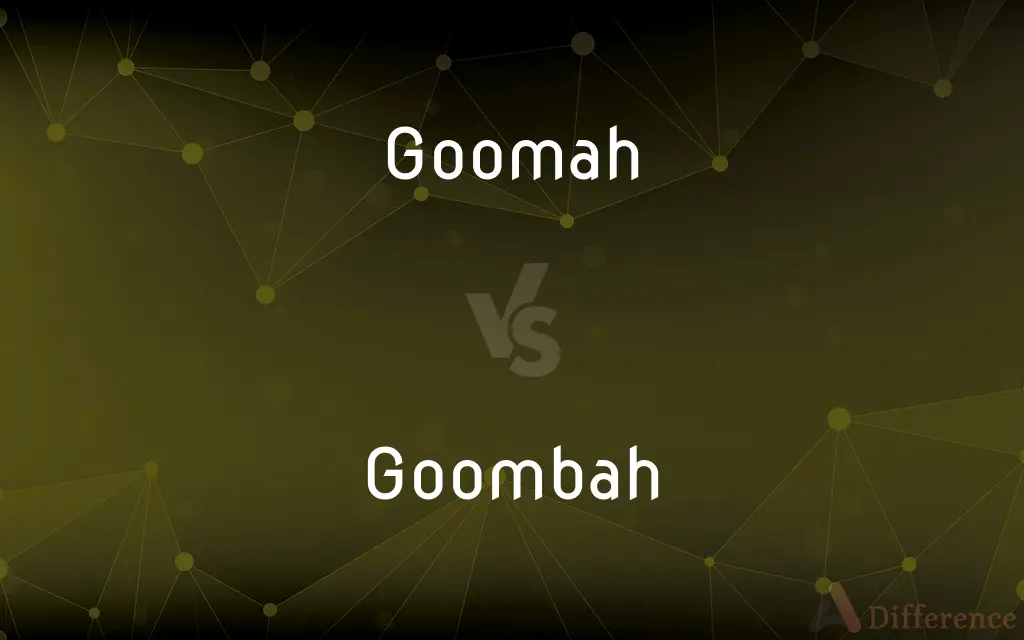Goomah vs. Goombah — What's the Difference?
Edited by Tayyaba Rehman — By Maham Liaqat — Updated on March 20, 2024
Goomah is a mistress or female companion, while Goombah signifies a close friend or associate, often in Italian-American communities.

Difference Between Goomah and Goombah
Table of Contents
ADVERTISEMENT
Key Differences
Goomah, derived from the Italian word "comare," typically refers to a man's mistress or female companion outside marriage. On the other hand, Goombah, originating from "compare" or "cumpà" in Italian dialects, is used to describe a close friend, associate, or even a godfather, especially within Italian-American communities.
While Goomah is primarily associated with romantic or extramarital relationships, Goombah emphasizes a bond of friendship, mentorship, or kinship. The term Goomah often carries a connotation of secrecy or discretion due to the nature of the relationship it describes, whereas Goombah is used more openly to signify strong personal bonds or connections.
The context in which Goomah is used is usually more private and might involve a level of discretion due to the nature of the relationship. In contrast, Goombah is often used in social contexts, reflecting camaraderie, loyalty, and sometimes a sense of belonging to a particular community or group.
Goomah is a term that might be considered controversial or sensitive due to its implications and the dynamics it represents. Goombah, however, is generally viewed in a more positive light, representing friendship and social connection, often without negative connotations.
Both terms underscore the influence of Italian language and culture on American English, particularly within Italian-American communities. While they both originate from Italian, their meanings in American English reflect the adaptation and evolution of these words in a new cultural context.
ADVERTISEMENT
Comparison Chart
Origin
Derived from Italian "comare," meaning godmother or mistress.
Comes from "compare" or "cumpà," meaning friend or companion in Italian dialects.
Meaning
Refers to a mistress or female companion outside of marriage.
Signifies a close friend, associate, or godfather, often in a familial or community context.
Connotation
Can imply secrecy or discretion due to the nature of the relationship.
Emphasizes camaraderie, loyalty, and social connection without negative implications.
Usage Context
Used in private or discreet conversations, often within male discourse.
Used openly to express strong personal bonds or connections within a community.
Cultural Influence
Reflects Italian-American slang and its adaptation in American culture.
Highlights the enduring impact of Italian familial and social structures in American communities.
Compare with Definitions
Goomah
A mistress or a woman with whom a man has a romantic relationship outside of his marriage.
He introduced her as his niece, but everyone knew she was his goomah.
Goombah
A term denoting a close friend, often like a brother, within Italian-American circles.
He's my goombah; we've been through thick and thin together.
Goomah
Can sometimes carry a negative connotation due to its association with infidelity.
The news of his goomah caused a scandal in their tight-knit community.
Goombah
Can imply a mentor or someone who offers protection and guidance, akin to a godfather.
As my goombah, he taught me everything I know about the family business.
Goomah
Often associated with individuals who maintain traditional views on masculinity and relationships.
In his circle, having a goomah was almost a status symbol.
Goombah
Reflects the value placed on loyalty and trust within certain communities.
In our neighborhood, your goombah is the one person you can always count on.
Goomah
Implies a relationship based on discretion and secrecy.
Their meetings were always discreet, befitting the nature of a goomah relationship.
Goombah
Used to express a deep bond that goes beyond mere friendship, often rooted in shared cultural heritage.
We're more than friends; we're goombahs, with a connection that's hard to explain.
Goomah
Slang term used in some Italian-American communities to refer to a man's extramarital female companion.
Despite his family values, he kept a goomah on the side.
Goombah
Symbolizes the importance of social connections and community in Italian-American life.
At the feast, he introduced me to all his goombahs, making me feel at home.
Goomah
A mistress.
Goombah
An associate or accomplice, especially a senior member of a criminal gang.
Goomah
(slang) The mistress of a Mafioso.
Goombah
Goombah is a pejorative slang term for people of Italian descent, mainly in the United States, with several related connotations to the Mafia (either the Italian-American Mafia, the original Sicilian Mafia, or other Italian organized crime groups) or gangs of Italian or Italian-American origin.
Goombah
A companion or associate, especially an older friend who acts as a patron, protector, or adviser.
Goombah
A person of Italian descent (often implies the person is connected to Italian organized crime)
Goombah
A companion, pal, close friend, or associate, especially among Italian-American men. It sometimes has the connotation of an older friend who acts as a patron, protector or adviser.
Common Curiosities
Are Goomah and Goombah interchangeable terms?
No, they refer to different types of relationships; Goomah is romantic or extramarital, while Goombah is platonic or familial.
Can a Goombah be female?
Traditionally, goombah is used to refer to male friends, but it can be used more broadly in some contexts.
Is the term Goomah considered derogatory?
It can be, depending on the context and tone, as it refers to an extramarital affair.
What is a Goomah?
A goomah is a mistress or female companion outside of a man's marriage, often kept discreet.
How did these terms become part of American English?
They were introduced by Italian immigrants and adapted into the slang of Italian-American communities.
Is Goombah used outside of Italian-American communities?
While its origins are Italian-American, it can be used more broadly to signify a close friend in other contexts.
Can someone have more than one Goombah?
Yes, it's possible to have multiple goombahs, indicating several close friendships.
Do these terms appear in popular culture?
Yes, both terms are often seen in movies and TV shows depicting Italian-American life, contributing to their recognition.
Can Goomah have a positive connotation?
Generally, it has a negative or controversial connotation due to its association with infidelity.
What does Goombah mean?
Goombah refers to a close friend or associate, akin to a godfather, within Italian-American communities.
Is Goomah used in official Italian language?
The term comes from Italian dialect but is not typically used in formal Italian.
How do Goomah and Goombah reflect Italian-American culture?
They illustrate the blending of Italian linguistic elements with American culture, reflecting community values and social dynamics.
Is Goombah considered a term of endearment?
Yes, it can be used affectionately to refer to a close or trusted friend.
Has the use of Goomah and Goombah evolved over time?
Yes, as with many cultural terms, their usage and connotations can shift and adapt over time.
Are there similar terms in other cultures?
Many cultures have their own slang for extramarital partners and close friends, reflecting universal human relationships and social bonds.
Share Your Discovery

Previous Comparison
Trombone vs. Sackbut
Next Comparison
Designed vs. DesignatedAuthor Spotlight
Written by
Maham LiaqatEdited by
Tayyaba RehmanTayyaba Rehman is a distinguished writer, currently serving as a primary contributor to askdifference.com. As a researcher in semantics and etymology, Tayyaba's passion for the complexity of languages and their distinctions has found a perfect home on the platform. Tayyaba delves into the intricacies of language, distinguishing between commonly confused words and phrases, thereby providing clarity for readers worldwide.














































